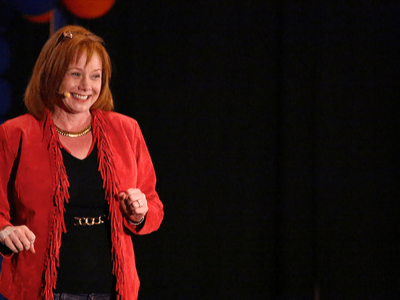Branding yourself can seem intimidating and you may wonder if it’s even helpful, but in a day and age as competitive as ours, its important to know how branding can shape you into a marketable young professional. To answer a few lingering questions, we talked with branding expert, coach, and speaker, Liz Goodgold. She is also the author of RedFire Branding: Create a Hot Personal Brand to Have Clients for Life and DUH! Marketing. Her third book, RedFire Speaking: How to Speak Gooder will be available in July. 99 Sure Fire Ways to Build Your Brand and Business is available for free by signing up for her Words of Lizdom at www.redfirebranding.com.
Who can create a personal brand?
Anyone considering a job hunt or promotion can, and should, create a strong personal brand, according to Goodgold, particularly students and recent graduates. By creating a recognizable idea of yourself, it shows people what to expect when working with you. Goodgold emphasizes the importance of distinguishing yourself from others given that, “It is the unbranded candidate that will remain unemployed and it is the forgettable employee that will be first fired.”
How can someone define his or her personal brand?
The first step in creating a personal brand, according to Goodgold, is listening to those around you. Ask everyone from your family to your fellow competitors about how they would classify you, and look for any overlapping ideas or descriptors that make them think of you. Using these key ideas, you can consider other people’s perception(s) of you, and take a closer look at shaping your “brand” based on how you wish to be perceived. If there are aspects of you that others do not pick up on, these are known as “gaps” in perception. Filling in these gaps can become an integral part of creating a personal brand, if you believe that an important part of you is being lost in translation.
How can you reinforce your brand?
”Exaggerate these brand attributes and stick to them religiously so that you remain consistent,” Goodgold said. “Remember: McDonald’s tastes the same today as it will tomorrow.” This consistency in branding is what reinforces the golden arches that continue to beckon to people like you and I.
Can a personal brand change over time?
Brands can shift, both intentionally and unintentionally, drastically and subtly. “Celebrity brands such as Tiger Woods, Mel Gibson, Meg Ryan, and Tom Cruise have all changed as a direct result of a publicity fall-out,” Goodgold said, “Not because of a master rebrand. Their comebacks, however, have been carefully crafted to burnish their brand image.”
Non-celebrities can take the same care in rebranding, but it takes a larger change than you might expect in order to allow others to change their expectations of you. If others have come to see you as the “Drama Queen” around your dorm, taking a day off from spreading gossip won’t be enough to change your entire image. Rather, you can take an active role in preventing drama, and discuss your intentions with close friends in order to find out what makes people perceive you in that way.
Goodgold also suggests a “visual change” to aid in your rebrand. “Shifting your wardrobe, cutting your hair, growing a moustache are all visual signs that you have changed.” These obvious changes in appearance will draw further attention to you and in turn, any shifts in your manner of being.
How do you know if you’ve successfully branded yourself?
Goodgold labels these key questions as ones that will signal your success in developing a personal brand:
- Do you have street cred? Do you have depth in your field and knowledge of key trends? Are you continuously improving your expertise and offerings? Becoming a brand without any core competency places you dangerously close to being categorized with Paris Hilton or Kim Kardashian.
- Do you have that certain “je ne sais quois”? Simon Cowell might call it the “X Factor:” the unique brand DNA that makes you interesting, exciting, and unforgettable. Carrie Underwood and Josh Krajcik definitely have it.
- Do you have a signature phrase? If you cook with “EVOO,” exclaim “Bam” after adding an ingredient or conclude your show with, “That’s a good thing” or “Semi-homemade,” then you’re on your way to a proprietary brand vocabulary.
- Do people know you by a single name? Is your moniker so unique and well-known in your arena that using your full name isn’t necessary? Examples: Seal, Bono, Beyoncé or even Adele.
- Do you have a strong visual brand-consistency? A unique and consistent look builds brand recognition. People want to know that what you look like today, you will look like tomorrow. Bruno Mars, for example, isn’t putting away his fedora any time soon.



















